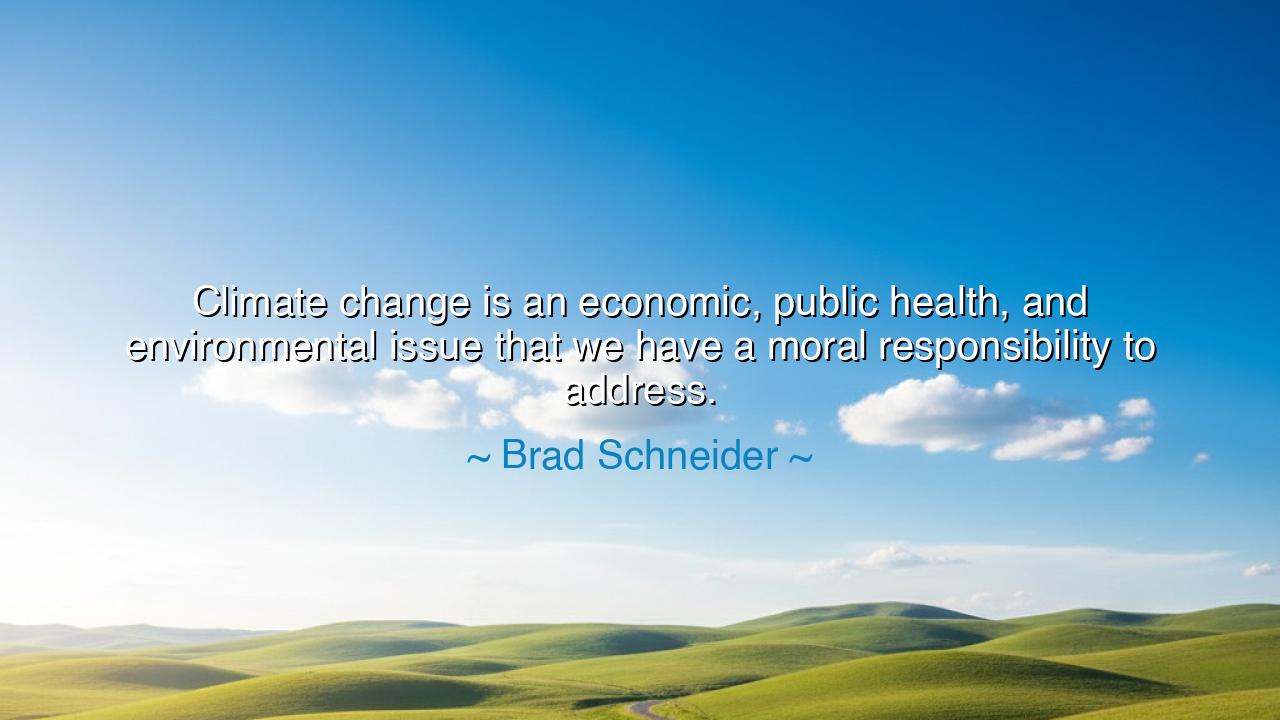
Climate change is an economic, public health, and environmental
Climate change is an economic, public health, and environmental issue that we have a moral responsibility to address.






The words of Brad Schneider fall like a solemn summons: “Climate change is an economic, public health, and environmental issue that we have a moral responsibility to address.” In this single sentence, he binds together the three great pillars upon which human life depends—our prosperity, our well-being, and the earth itself—and declares that they are all threatened by the rising storm of climate change. Yet beyond this recognition lies an even greater truth: that the challenge before us is not only practical, but moral. For to ignore the suffering of our neighbors, to exploit the land without care for tomorrow, is to betray both conscience and future generations.
At its heart, this quote is a reminder that climate change is not a distant abstraction, but a force already shaping lives and societies. As an economic issue, it threatens livelihoods with droughts that ruin harvests, floods that swallow cities, and storms that destroy industries in a single night. As a public health issue, it spreads diseases through warming waters, worsens asthma with polluted air, and brings heat that kills the vulnerable. As an environmental issue, it lays waste to forests, melts glaciers, and unravels the intricate balance of creation itself. Schneider’s wisdom is that all these threads are woven together: to ignore one is to unravel them all.
History gives us grave lessons of this truth. Consider the fate of the Easter Islanders, who cut down their forests without restraint to build monuments and fuel their needs. In their pursuit of the present, they stripped away the resources of the future. The result was collapse: famine, conflict, and the fall of their once-thriving society. Their tragedy whispers across time, teaching us that environmental neglect is not only an ecological failure, but an economic and moral one. When the land dies, so too does the people who depend upon it.
But Schneider adds a deeper dimension: moral responsibility. This is not a matter of choice or convenience, but of duty. Just as past generations bore the weight of abolishing slavery, fighting tyranny, or expanding justice, so too must this generation bear the burden of protecting the earth. For climate change is not neutral—it strikes hardest the poor, the sick, and the young. To act is to protect those who cannot protect themselves. To delay is to condemn them to suffering not of their making. Here the challenge becomes more than political; it becomes a test of the human soul.
We may also learn from examples of courage. In the twentieth century, nations united under the Montreal Protocol to confront the thinning ozone layer. Scientists warned of catastrophe, industries resisted, but leaders acted with urgency. The world banned harmful chemicals, and the ozone has begun to heal. This story proves that humanity can face global crises when it treats them not as burdens to postpone, but as responsibilities to embrace. Schneider’s words call us to believe that the same courage can and must be summoned today.
The lesson is clear: every delay compounds the cost, and every small action matters. Individuals can reduce waste, conserve energy, and speak truth to leaders. Communities can build resilience and demand cleaner industries. Nations can choose cooperation over denial, long-term vision over short-term profit. Above all, each must recognize that this is not someone else’s duty—it is ours. To live in this age is to inherit this fight, and to shirk it is to betray both past and future.
Therefore, children of tomorrow, let Schneider’s words be carved upon your hearts: climate change is not only about science and policy, but about justice and morality. It is about who we choose to be in the face of peril—selfish and blind, or courageous and wise. Stand then as guardians of the earth, defenders of health, protectors of prosperity. Act not only for yourselves, but for generations yet unborn. For the measure of our age will not be in what we possessed, but in how we answered the greatest responsibility ever laid upon humankind.






AAdministratorAdministrator
Welcome, honored guests. Please leave a comment, we will respond soon